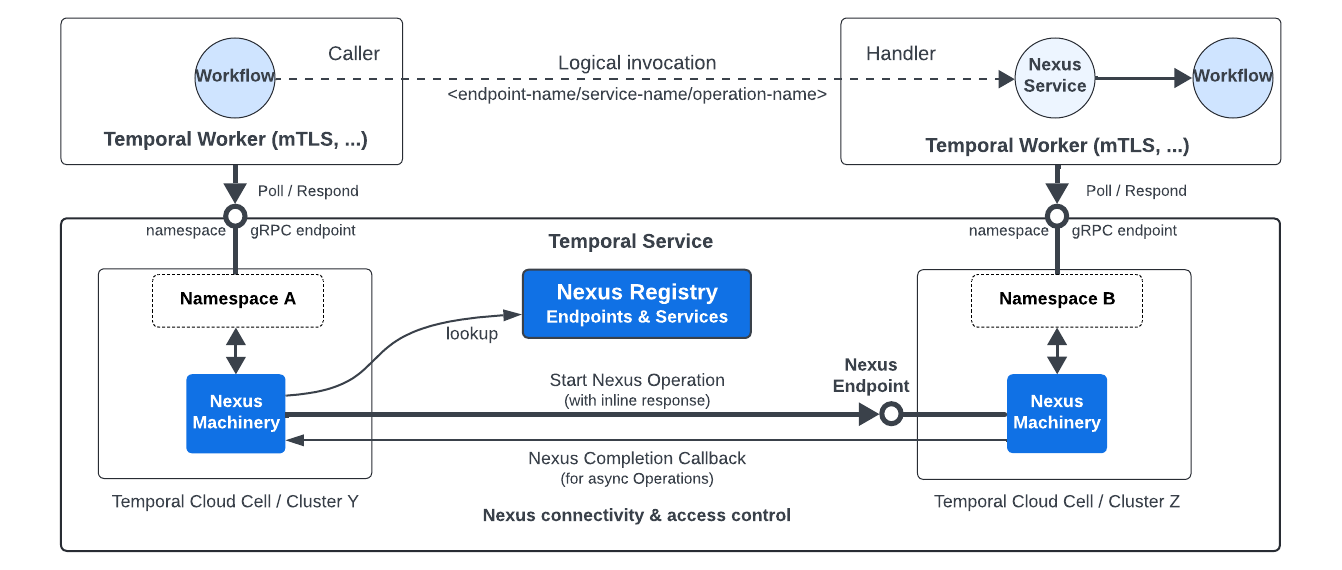Security in Temporal Nexus
Temporal Nexus is available in Public Preview for Temporal Cloud and self-hosted deployments.
Nexus supports restricting access to Nexus Endpoints. Temporal Cloud has built-in Endpoint access controls and provides secure Nexus connectivity across Namespaces. For self-hosted deployments you can implement custom Authorizers.
Runtime access controls
In Temporal Cloud, access to a Nexus Endpoint at runtime is controlled by the Endpoint's access control policy (allowlist of caller Namespaces) for each Endpoint in the Nexus Registry.

Workers in each Namespace may authenticate with Temporal Cloud as they do now with mTLS certificates or API key as allowed by the caller Namespace.
Once a Worker has authenticated it can send Nexus Operation commands to Temporal Cloud using a Temporal SDK to start a Nexus Operation in a different Namespace.
For example, in the Temporal Go SDK a caller Workflow would use nexusClient.ExecuteOperation to issue a command to start a Nexus Operation.
To process a ScheduleNexusOperation command from a caller Workflow, Temporal Cloud obtains the handler Namespace and Task Queue for the handler endpoint, and restricts access by verifying that the caller's Namespace is in the endpoint's allowlist.
In this way, Temporal Cloud acts as a trusted broker across Namespace boundaries, and relies on authenticated workers in each Namespace.
See Configure Runtime Access Controls for additional information.
Secure connectivity
Temporal Cloud has built-in security connectivity across all Namespaces in an Account.
Self-hosted deployments rely on the Temporal Cluster being secure.
In Temporal Cloud multiple security provisions are in place to ensure it can act as a trusted broker across Namespace boundaries:
- Workers authenticate to their Namespaces via mTLS or an API key as allowed by their Namespace configuration.
- mTLS is used for all Nexus communication, including across cloud cells and regions, to:
- Start or Cancel a Nexus Operation.
- Callback on completion of an asynchronous Nexus Operation.
- Nexus Endpoints are only privately accessible from within a Temporal Cloud account.
- Accessible from within a caller Workflow using the Temporal SDK.
- Not externally accessible for arbitrary clients yet.
Payload encryption and Data Converter
The Data Converter works the same for a Nexus Operation as it does for other payloads sent between a Worker and Temporal Cloud. The caller and handler Workers must have compatible Data Converters as operation inputs and results are passed between the two.
If encryption keys are used to encrypt payloads, they must be available in both the caller and handler. For example, the caller and handler can use a shared symmetric key stored in your KMS.
Please let us know if you need per-Service payload encryption or better handling for asymmetric encryption keys.
Nexus Registry security
See Nexus Registry Roles and Permissions.
Learn more
- Evaluate why you should use Nexus and watch the Nexus keynote and demo.
- Learn how Nexus works in the Nexus deep dive talk.
- Explore additional resources to learn more about Nexus.